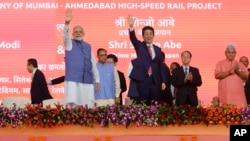Wrapping up a two-day visit to India, Japanese Prime Minister Shinzo Abe called for strict enforcement of a U.N. resolution against North Korea over its latest nuclear test.
After holding talks Thursday with his Indian counterpart, Abe said, “I’d like to appeal to the world, together with Prime Minister [Narendra] Modi, that we need to have North Korea change its policy through the thorough implementation of the newly adopted Security Council resolution by the international community.”
Saying North Korea will have to roll back its missile and nuclear program, Abe said that Japan and India will take firm steps against the challenges coming from there. He said both leaders had agreed on the need to make North Korea change its policies.
In a joint statement, the two prime ministers strongly urged North Korea to abandon its nuclear and ballistic missile programs and not to take any further provocative actions.
Transportation projects
Earlier in the day, Abe inaugurated India’s first bullet train project in the western city of Ahmedabad and told a cheering audience the Indo-Japan friendship has developed into a strategic and global partnership in the Indian-Pacific region. "A strong India is in Japan's interest and a strong Japan is in India's interest," he said.
The $17 billion high-speed train project is the most visible signal of tightening ties between two Asian countries that are wary of an increasingly assertive China.
The train will make the 508-kilometer journey between Ahmedabad and the financial hub of Mumbai in a little more than two hours, boosting connectivity in one of India’s most industrialized and developed regions.
Pointing out that Japan has given virtually an interest free loan to cover most of the high-speed train’s cost, Modi called it a big gift.
Fending off criticism that India should focus on overhauling its creaky, aging rail network instead of building expensive trains, Modi said the bullet train project “will bring great speed, great development and great technology to the country," and create thousands of jobs.
Defense partnership
The two countries signed 15 agreements and discussed strengthening their defense partnership and expanding cooperation in civil nuclear energy. “We see really Japan as a very significant partner in nuclear power projects, which we will be doing with other countries as well,” according to foreign secretary Subrahmanyam Shivshankar.
He said connectivity projects will be a special focus in India's remote, underdeveloped northeastern states that border China and Myanmar, and in East Asia. The two countries also plan to implement infrastructure projects in African countries. Japan and India recently launched an initiative called the Asia Africa Growth corridor that is seen as a counter to China’s One Belt One Road initiative.
Analysts say there has been a huge transformation in relations between the two countries in recent years and point out Japan was the only country that openly supported India’s stand during a recent border standoff with China.
Prime Minister Modi told reporters that “mutual trust, dependability and an understanding of each other’s concerns are the hallmark of our friendship.”




